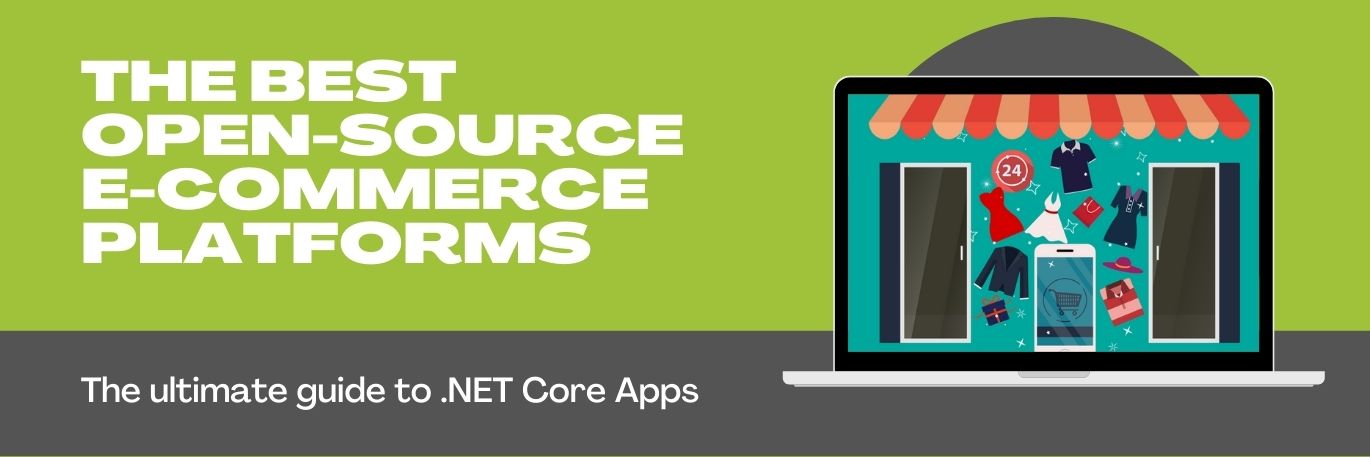When you start the online business, you will face probably the most difficult question. Technological development in recent years has made our choice practically unlimited. Thus, for many novice entrepreneurs and shop owners, the choice has become very difficult. Only in our industry, platforms based on .NET, we can distinguish some great and many useful applications, what about applications based on other programming languages? You can get headaches.
The purpose of this article is to present you with the best web applications based on .NET and .NET Core, show you their greatest advantages and disadvantages. After that, I’m pretty sure that you will be able to choose the best .NET e-commerce platform for your new business.
The requirements of each user are completely different. You won’t find a person with a ready-made recipe for success. Of course, we can discuss the possibilities, advantages, and disadvantages, but the right choice must be preceded by careful analysis.
However, there are many factors you can consider and reduce your pool of potential choices. What can you expect from this article?
- A brief summary of the most popular open-source, ASP.NET e-commerce platform
- A detailed summary of chosen platforms which in my opinion are the best for the majority of users
- A small table, which can be shared via social media, summarizing the entire report and comparison
List of content:
- What is an e-commerce platform? SaaS, open-source, or headless, what are your options?
- Best open-source ASP.NET e-commerce platforms
a) GrandNode
b) SmartStore
c) Sitefinity
d) VirtoCommerce
e) DNN
f) Kentico
g) SimplCommerce
h) Umbraco
i) Sitecore
j) nopCommerce - Best other open-source e-commerce platforms
a) Magento
b) PrestaShop
c) Sylius
d) Saleor
e) OpenCart - How to choose the best e-commerce platform?
What is an e-commerce platform?
In the simplest words, an e-commerce platform is an online software application that allows online businesses and companies to manage their online sales, website, marketing.
Platforms like GrandNode offer powerful e-commerce features, probably GrandNode is the most advanced e-commerce platform. Such platforms offer you also almost limitless possibility to integrate your online business with the current ecosystem.
For example, Webhooks, and Web API can be used to integrate your online store with CRM, ERP, POS, or any kind of marketing tool like MailChimp, if you want to learn more about integrating MailChimp with e-commerce, it’s the best time to check MailChimp integration with GrandNode.
SaaS, open-source, or headless, what are your options?
First of all, you have three options, two of them will be probably recognized by you, but the third one is a pretty modern solution, and for many of you, might be new.
open-source
SaaS
headless
The first type is probably the oldest and most popular type. Usually, it’s free, open-source software, which can be installed on your own hosting. This way is usually preferred by developers and more technical entrepreneurs. It gives you complete freedom in customization and development. However, it requires technical knowledge from owners.
The second type is Software-as-a-Service. It’s a type of software when you “rent” the e-commerce platform. The fact is that SaaS software removes the complexity of running an online business. You don’t have to think about hosting, all technical stuff. It’s all about paying the monthly fee, and that’s all.
The third type — headless. For many developers, it’s the voice of the future. At a glance, headless commerce is an e-commerce platform that stores, manages, and delivers content without a front-end layer. In a nutshell, in a headless e-commerce platform, the “head”, so front-end layer(mostly theme) has been removed. Well, is it good or not? It’s not my business to judge, but it will certainly find its supporters. It certainly has its advantages, but I can’t say it’s the best e-commerce platform type.
Open-source and headless give you unlimited customization and development possibilities. The main benefit is that you are not dependent on any company. You become the “owner” of your store, the source code of it, and every custom implementation that you will make. SaaS businesses may disappear from the market at any time.
Best open-source ASP.NET e-commerce platforms
GrandNode
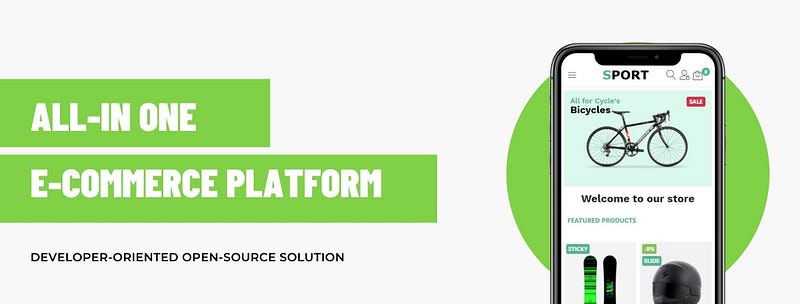
GrandNode is an e-commerce platform for developing online stores. It gives you the possibility to create highly advanced, good-looking online stores that have unlimited power of customization.
The store owner challenges
GrandNode was designed to solve the most important business challenges in the world of digital shopping. The goal for us is to provide the platform with:
The high-performance front-end, rendered within milliseconds,
The high-performance application to handle temporary and permanent traffic overloads,
Highly advanced e-commerce platform with unlimited possibilities of integration with existing third-party software
Fast development with the modern codebase
Scalable e-commerce platform to grow with the business
Pros
The biggest advantage of GrandNode is a fact that it has the widest range of functionalities through all e-commerce platforms listed in this report. By the widest range of functionalities, I mean features that are available out of the box, without the need to install external plugins.
Every developer will appreciate the fact that Web API is available as a standard feature of the application. It will ease up the integration process. Implemented Web API allows creating highly advanced workflows.
The whole application is based on Mediator. Fundamentals built on SOLID principles guarantee the highest quality code.
GrandNode achieves the highest ranks in all performance and speed tests available on the internet. You can check the official performance stress test summary.
Advanced logging with Serilog. Possibility to save logs in the File, send them via e-mail, or show in the console.
Technology Stack
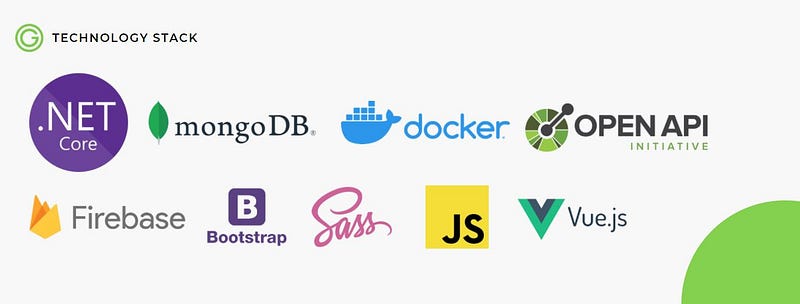
Price & Business model
GrandNode is an open-source e-commerce platform, it can be downloaded from GitHub, or an official site and installed on hosting or cloud. GrandNode can be also configured via a preinstalled 1-click app on DigitalOcean cloud.
Typical businesses size
GrandNode can be easily adopted in every size of online business. Thanks to the number of features, it can be a perfect solution for small stores, however, the full potential can be shown only in Medium to the Enterprise. Where you need the highest performance, speed, functionality.
Partners
GrandNode partnership program contains three levels of partnership. Silver, Gold, and Platinum. The main goal of the partnership program is to share know-how and resources that can be used in future projects. The Solution partners program does not include sharing leads, but guarantees that you will receive materials that will help you create new projects. (Like a package of premium plugins with source code).
Marketplace
On the GrandNode marketplace, you will find plugins and premium themes made by GrandNode Team.
Themes: 15
Extensions: 92 (to the newest version)
License
GPL-3.0
Resources
Official site: https://grandnode.com
Forum: https://grandnode.com/boards
GitHub: https://github.com/grandnode/grandnode
SmartStore

SmartStore is the first e-commerce platform based on nopCommerce. A few years ago, same as GrandNode, but earlier, creators decided to give up the connection with the nopCommerce project and community and create their own creation.
License
The community edition of SmartStore is licensed under the GNU General Public License v3.0.
Price & Business model
SmartStore has 4 levels of pricing. First and the simplest (basic version) is free and open-source. You can download it from GitHub.
The rest of the options are paid:
Professional — 1490 € / one-time
Premium - 3990 € / one-time
Enterprise — to get a quote you should contact the sales team
Pros
SmartStore has probably the most advanced Content Management features from .NET based e-commerce solutions. The main advantage is a drag-n-drop page builder.
Resources
Official website: https://smartstore.com/
Forum: http://community.smartstore.com/
GitHub: https://github.com/smartstore/SmartStoreNET
Progress Sitefinity
Sitefinity is a Web Content Management System created by Progress. It is based on WebForms and .NET 4.7.

Sitefinity CMS and all Sitefinity derivatives are a part of Progress. It happened when Progres became the owner of Telerik and derivatives of .NET.
In addition to CMS, Sitefinity provides a functional e-commerce extension, which allows you to run your business online. This solution is called Digital Commerce.
License
Sitefinity is not open-source software. You are able to purchase it, Sitefinity has 3 editions:
Professional
Online marketing
Enterprise
If you want to learn more about the Sitefinity editions, the best place to do it, it’s their official pricing page.
Resources
Official site: https://www.progress.com/sitefinity-cms/digital-commerce
Forum: https://community.progress.com/s
VirtoCommerce
Virto Commerce is an open-source platform for extensible e-commerce applications. Authors describe VirtoCommerce as a complex digital commerce solution for B2B, B2C, or B2B2C businesses, marketplaces and derived SaaS commerce platforms. Virto Commerce architecture was designed on principles: Microservices, API-first, Cloud-native, Headless, and Advanced Extensibility.
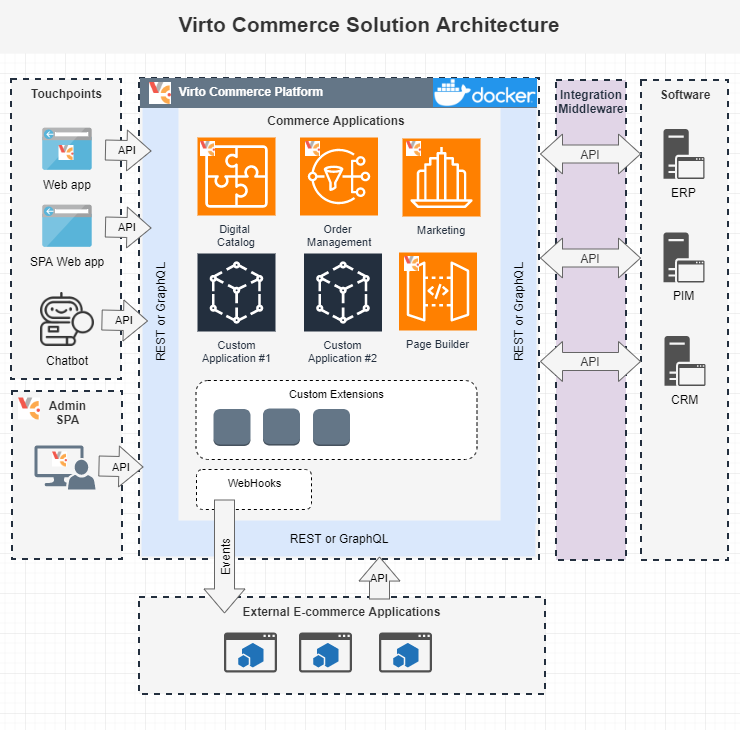
License
VirtoCommerce is licensed under the Virto Commerce Open Source License Version 3.0 (“VCOSL”).
Marketplace
Extensions: 43
Themes: 5
Resources
Official site: https://virtocommerce.com/
Forum: https://www.virtocommerce.org/
GitHub: https://github.com/VirtoCommerce/vc-platform
DNN
DotNetNuke is an open-source content management system based on ASP.NET WebForms. DNN is a very customizable platform that can be used to build an e-commerce website, blog, or custom web app.
DNN history started in 2003, since that time DotNetNuke became a leading .NET CMS provider.
According to their official GitHub readme:
It can be used to build professional looking and easy-to-use commercial websites, social intranets, community portals, or partner extranets. Containing dynamic content of all types, DNN sites are easy to deploy and update. The DNN Platform has been downloaded more than 8 million times and powers more than 750,000 websites globally. A community of more than 1 million members forms a powerful support network.
Resources
Official website: https://www.dnnsoftware.com/
GitHub: https://github.com/dnnsoftware/Dnn.Platform
Kentico
What is Kentico? Kentico is a web content management system based on ASP.NET and MSSQL.
The first initial release is dated on 1st August 2006. In 2010 Kentico was called the fastest growing technology company in the Deloitte FAST 50.
Pricing
Kentico is delivered in 3 different pricing plans.
Business — $9,999
Enterprise-$17,999
Corporate — the biggest plan, to get more details you need to contact a sales team
More details can be found on the detailed Kentico’s pricing plan page.
Resources
Official site: https://kentico.com
GitHub: https://github.com/Kentico
SimplCommerce
SimplCommerce is probably the simplest project from this rank. However, even if it’s the smallest one, it doesn’t mean that it doesn’t have its fans.
SimplCommerce is a free, open-source, modular, and cross-platform e-commerce platform.
Pricing
SimplCommerce is available to download for free.
Marketplace
SimplCommerce doesn’t have the marketplace with the plugin, so you are limited to internal development.
Partners
SimplCommerce offers a partnership program. Currently, you can find 7 partners, and they aren’t connected with SimplCommerce itself in any legal way.
License
SimplCommerce is licensed under the Apache 2.0 license.
Resources
Official site: https://www.simplcommerce.com/
GitHub: https://github.com/simplcommerce/SimplCommerce
Umbraco
Umbraco history starts in 2000. It’s an open-source content management system based on ASP.NET. According to Umbraco GitHub page
Umbraco is the friendliest, most flexible and fastest growing ASP.NET CMS, and used by more than 500,000 websites worldwide. Our mission is to help you deliver delightful digital experiences by making Umbraco friendly, simpler and social.
Umbraco out-of-the-box is only a CMS system, to transform your Umbraco into an e-commerce platform, you need to use for example uCommerce.
Ucommerce is bringing enterprise commerce features and functionality to the global Umbraco eco system.
Ucommerce is the most mature e-commerce platform for Umbraco, since 2009 they develop it for Umbraco too.
The interesting fact is that uCommerce is available also for other ASP.NET CMS, instead of Umbraco, you can use uCommerce also in Sitefinity and Sitecore. Check how to use uCommerce in Sitecore and how to use uCommerce in Sitefinity.
If you want to check the price of uCommerce, it’s the best time to save the uCommerce pricing plans for later.
License
Umbraco CMS is licensed under MIT license.
Resources
Official site: https://umbraco.com
Forum: https://our.umbraco.com/forum
GitHub: https://github.com/umbraco/Umbraco-CMS
uCommerce: https://ucommerce.net/platform/umbraco/
Sitecore
Sitecore similarly to Sitefinity is a Web Content Management System that can be transformed into a digital commerce solution.
It gives you the possibility to customize the page with the WYSIWYG editor. Thanks to that, you are able to provide a customized and personalized experience for your customers.
Sitecore XC combines commerce, digital marketing capabilities, and content management tools.
Pricing
Sitecore may be a pretty expensive choice. Sitecore’s subscription-based licensing takes multiple factors into account:
Visits per month
Non-production installations
Concurrent users
Add-on modules
Allows for expansive non-production and production installations
Marketplace
On the Sitecore marketplace, you will find 952 extensions, not necessarily related to e-commerce.
Partners
Sitecore has over 200 solution partners.
License
Sitecore is a paid solution.
Resources
Official site: https://www.sitecore.com/
nopCommerce
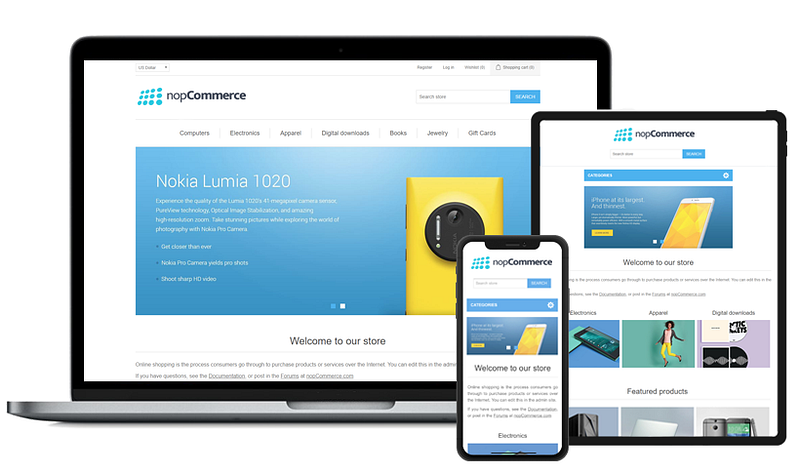
nopCommerce is one of the oldest e-commerce platform described in the guide. It has been created in 2008. nopCommerce is dedicated to small-medium size businesses. Due to the fact that it has the longest history, nopCommerce is also the most popular e-commerce platform from this report.
Pros
nopCommerce’s greatest asset is its community. They have over 12 years of history, the community is the most numerous among the other solutions listed in this comparison. Even if it’s not as active as it was a few years ago, it still has a great potential to be the best .NET based community of e-commerce platforms.
Price & Business model
As a typical open-source e-commerce platform, nopCommerce can be downloaded from GitHub and installed on hosting or cloud.
License
GNU General Public License v3.0 with a “Powered by nopCommerce” information in the store footer.
Typical businesses size
Small to medium. nopCommerce will be beloved by store owners, which want to create an online store, with ready to go set of plugins. In that scenario, you are limited to the features provided by vendors.
Partners
nopCommerce community is based on solution partners. Solution partners are usually the most active community members.
Solution partners in numbers
Registered: 29
Silver: 72
Gold: 30
Marketplace
nopCommerce marketplace contains free products made by the nopCommerce Team and free and paid extensions made by the community. The fact is that also many vendors started to sell extensions only on their website, without listing on the nopCommerce marketplace, i.e nop4you, one of the oldest nopCommerce solution partner.
Themes: 39 (33 paid, 6 free)
Extensions: 281 (197 paid, 84 free)
Resources
Official site: https://nopcommerce.com
Forum: https://nopcommerce.com/boards
GitHub: https://github.com/nopsolutions/nopcommerce
Best other open-source e-commerce platforms
Magento
It’s probably the most recognized e-commerce platform. Purchased by Adobe. It’s used by developers to create large online stores. Unfortunately, this is done by quite high requirements of server price and bad out-of-the-box performance. We would not recommend Magento for users with a small database of products.
The biggest downside of Magento is the fact that the optimization and performance tweaks will cost more than the original development.
Price & Business model
Magento is distributed with paid packages, but it’s also available to get from GitHub. In this comparison, we will treat Magento as a free, open-source solution.
Partners
Magento partnership program has three types of partners. You will find there Solution partners, Technology Partners, and Community Insiders. In the other words, Community Insiders are certified Magento developers.
Solution partners: 247
Technology partners: 16
Marketplace
Magneto marketplace is reserved for the solution partners. You will find there the products created by Magento solution partners. In the case of numbers, similarly to PrestaShop, Magento marketplace looks impressive.
Extensions: 3524
Themes: 11
Resources
Official site: https://www.adobe.com/commerce/magento/
Forum: https://community.magento.com/
GitHub: https://github.com/magento/magento2
PrestaShop
It’s one of the most popular open-source e-commerce platforms. It is written in the PHP programming language with support for MySQL. PrestaShop started in 2005 as a student project in Paris. The company, PrestaShop SA, was founded in 2007 by Igor Schlumberger and Bruno Lévêque.
Price & Business model
PrestaShop is free and open-source software. It can be downloaded from their website or GitHub profile and installed on your own server.
License
PrestaShop is licensed under OSL-3.0 and PrestaShop Modules are licensed under AFL-3.0.
Marketplace
The PrestaShop marketplace is pretty impressive when we consider the number of premium products. It’s probably one of the biggest marketplaces in open-source e-commerce platforms communities.
Modules: 3800
Themes: 2410
Resources
Official site: https://www.prestashop.com
Forum: https://www.prestashop.com/forums/
GitHub: https://github.com/PrestaShop/PrestaShop
Sylius
It’s an open-source, e-commerce platform, based on top of Symfony. Perceived as a modern, next-generation platform.
According to the official Sylius website, they describe themselves as:
Open Source Headless eCommerce Platform for mid-market and enterprise brands that need custom solutions. With a modern approach to the professional development of projects, it allows the evolution of your digital stack at the pace that beats your competitors and delivers the experience your Customers deserve. To be at the top of the backend eCommerce technology race, we have decided to build Sylius APIs with API Platform — a framework to develop modern API-driven projects, beloved by all Symfony developers.
Sylius, similarly to GrandNode and Saleor was developed in Poland.
Partners
Partner network in Sylius is divide into three parts-Solution partners, extensions partners, and technology partners.
Technology partners: 2
Solution partners: 39
Extensions partners: 6
Marketplace
On Sylius marketplace you will find plugins made by the core team and their partners.
Number of plugins: 78
License
MIT License
Resources
Official site: https://sylius.com/
Forum: https://forum.sylius.com/
GitHub: https://github.com/Sylius/Sylius
Saleor
According to the Saleor GitHub page, they describe themselves as:
A rapidly-growing open source e-commerce platform that has served high-volume companies from branches like publishing and apparel since 2012. Based on Python and Django, the latest major update introduces a modular front end powered by a GraphQL API and written with React and TypeScript.
At first glance, in my opinion, it is a minimalist tool, dedicated to further implementation.
Resources
Official site: https://saleor.io/
Forum: https://spectrum.chat/saleor?tab=posts
GitHub: https://github.com/mirumee/saleor
OpenCart
It is a free open source e-commerce platform for online merchants. OpenCart is one of the oldest e-commerce platforms in the industry. . As of May 2016, 342,000 websites were using OpenCart. Which is a pretty awesome score. It is PHP-based, using a MySQL database.
License
GNU General Public License v3.0
Partners
OpenCart partnership program
Partners: 75
Marketplace
OpenCart marketplace contains a lot of
Resources
Official site: https://opencart.com
Forum: https://forum.opencart.com/
GitHub: https://github.com/opencart/opencart
How to choose the best e-commerce platform?
Well, we are not able to give you a clear answer to that question. There are so many factors that influence your final choice that any articles that tell you to use the X or Y platform are pointless.
First of all, you need to answer some important questions. Right now, you must remember to look beyond the first weeks of the store’s operation.
To avoid wasting more money after a few weeks or months. Think about what functions you may need in the future. If you are selling standard, simple products now, think about whether in a month, for holidays or other Christmas, you will not need a set of products.
Product kits allow you to combine a few independent products into one kit, with an independent price. Look for an out-of-the-box feature or plugin which will support it. If not, you will be forced to purchase a custom development, or to find a weird workaround.
What about integrations? If you don’t have an ERP system today, it doesn’t mean that you won’t have it in the future. Check the current possibilities, look for existing ERP integrations, check if the solution has the Web API, mostly you will need to connect the ERP system with the store.
We also recommend checking something, which is called — Webhooks. A webhook delivers data to other applications as it happens, meaning you get data immediately, for example in CRM, ERP, or any kind of third-party. Unlike typical APIs where you would need to poll for data very frequently in order to get it in real-time. The main, simplest purpose of webhooks is to send a new order to your ERP system immediately, without the need to trigger the API once a minute, or once an hour.
Below, on the infographic, you will find the summary of the most popular ASP.NET e-commerce platforms, we’ve compared the most wanted e-commerce features in it. You will be able to pre-select the potentially best platform for you.
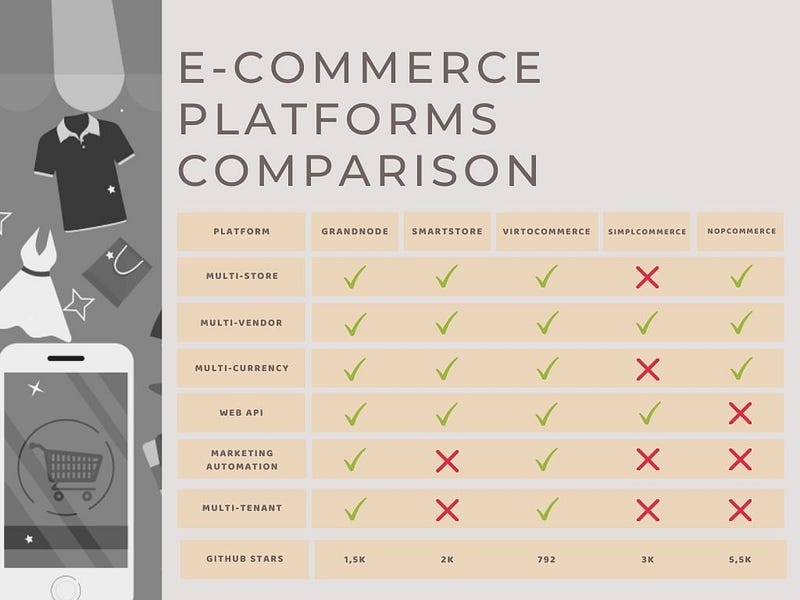
This article will be updated frequently, to provide as many details as it’s possible. If you want to cooperate, just drop us a line. We will work on it together!


